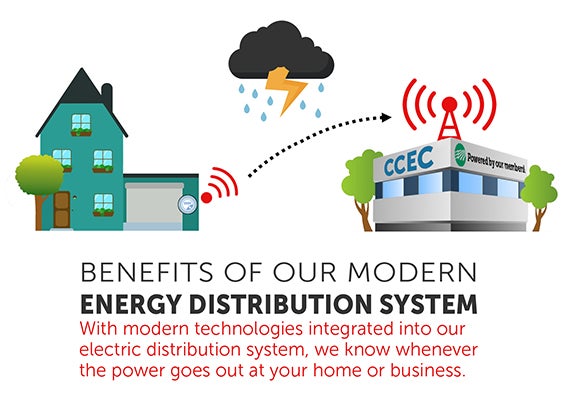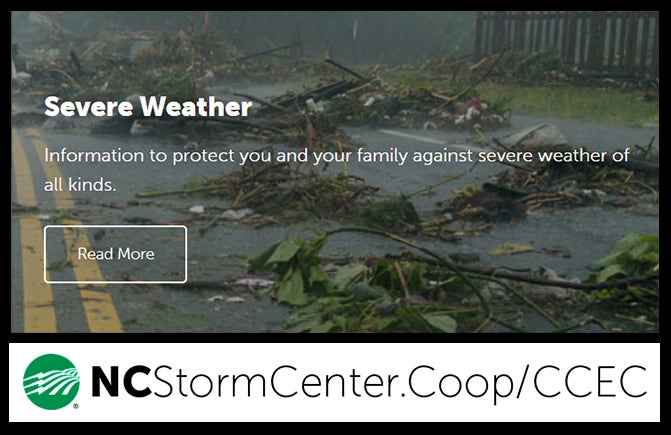
Did you know you don't need to call if the power goes out?
Our substation monitoring system and automated metering infrastructure (AMI) system send us signals when the power goes out at the substation level, as well as at each meter.
Our online outage map uses data from our Automated Metering Infrastructure (AMI) meters, our substation monitoring system, as well as member reports, to show the location of outages on our system.
The map is particularly useful during widespread outages, like those experienced during hurricanes and other severe weather events that cause damages across our distribution system.
After a major outage, if your power is still out when the power comes on around you and you have checked your breakers, fill out the form below, text "OUT" to 1.800.682.2217 from your smart device, of give us a call.
Storm Center Link
Working safely to restore power is paramount here at CCEC. Helping keep you safe is a priority, too. For a one-stop-shop for important information to prepare and protect you and your family during severe weather, click here.

Report An Outage
Carteret-Craven Electric Cooperative members on our medical priority list should have either backup power (battery backup or generator) or a backup emergency plan to move to another location where electricity can be provided to meet their medical needs.
Members on the list have a special seal affixed to their meter bases that alerts us that someone in the household has a medical condition that requires part-time or continuous use of specialized medical equipment that must have electricity to operate.
The cooperative tries to inform those members of planned outages, However, during major outage situations such as those caused by hurricanes or other major storms, CCEC cannot guarantee that medical alert members’ electrical service will be one of the first to be restored.
Most hospitals or doctors’ offices can refer you to facilities to use in case of major power outages. You should contact these facilities to make necessary arrangements for shelter before a major outage occurs.
A power outage in your house or apartment is a major inconvenience. The reason behind the outage, however, is not always clear. You may be without electricity for a number of reasons. Here's how to troubleshoot an electrical outage, together with suggested solutions.
Are Your Neighbors Without Power, Too?
Investigate to see whether the power failure is limited to just a part of your home. If you're working in the kitchen, for example, try clicking on a light switch in the living room. If the electricity is not functional anywhere in your house, look outside. See whether lights are visible at your neighbors' or phone them to ask if they have power. In an apartment building, look to see whether the hallway lights are on.
When the power outage affects more than just your home, check your utility outage map to see if there is a larger outage in your area and get updates on the estimated restoration time.
Turn off your light switches and unplug electrical devices to protect them from power surge damage when the service is restored.
If the Problem is Limited to Your Home
When the problem is limited to your home – or only one part of your home – grab a flashlight and take a look at any ground-fault circuit interrupter (GFCI) receptacles, your circuit breakers, main breaker, or fuse box to troubleshoot the electrical failure. On GFCI receptacles, which area usually found in bathrooms and kitchens. try pushing the reset button. If that isn’t the solution, you will need to see if a breaker has tripped or a fuse has blown.
When the Main Breaker Trips or Branch Breakers Can't Be Reset
Turn off or unplug as many appliances and electronic devices as possible throughout your home. Go back to the circuit breaker and flip all the breakers off. Turn the main breaker switch on and off several times, finishing in the "on" position. Then reset each of the breakers, one at a time. If this causes the main breaker to trip or if you are unable to reset one of the branch breakers, you'll know that you have a problem with that circuit, which will need professional electrical repair.
If Reconnecting an Electrical Device Causes a Tripped Branch Breaker
If, on the other hand, you have no trouble resetting the branch breakers and the main breaker does not trip, the problem may be due to a faulty appliance or other piece of electrical equipment. Narrow down the possibilities by reconnecting all devices that were plugged in previously, one by one, to see whether any of them causes a tripped breaker. If so, repair or replace the item.
When the Main Breaker Trips Repeatedly
You may find that the main breaker trips repeatedly but there are no apparent electrical problems. Keep track of when this usually happens. It could be that running a large number of appliances at the same time is drawing current in excess of the main breaker's capacity and resulting in an overload of your electrical system. (Often the culprit can be a relatively small appliance that uses a great deal of current, such as a blow dryer or space heater.) There are 2 solutions to this problem: 1) reduce the load on your electrical system or 2) hire a licensed electrician to upgrade your home's electric panel.
Power Outage Safety Tips
- When troubleshooting a power failure, never touch your breaker panel or fuse box with wet hands or while standing in water.
- Do not use any tools to flip the breakers or replace fuses – this can be easily done by hand.
- Consider installing a surge suppressor to protect your valuable electronics and appliances against damage due to power surges.
- Make sure you always have a flashlight or battery-powered LED lamp close at hand.
 As a Weather-Ready Nation Ambassador, CCEC will promote useful and relevant information from the National Oceanic and Atmospheric Administration (NOAA) and their affiliate agencies, like the National Weather Service, to our members in an effort to help them become ready, responsive and resilient to severe weather events.
As a Weather-Ready Nation Ambassador, CCEC will promote useful and relevant information from the National Oceanic and Atmospheric Administration (NOAA) and their affiliate agencies, like the National Weather Service, to our members in an effort to help them become ready, responsive and resilient to severe weather events.
Here are a few links that may help you before, during and after a severe weather event.

